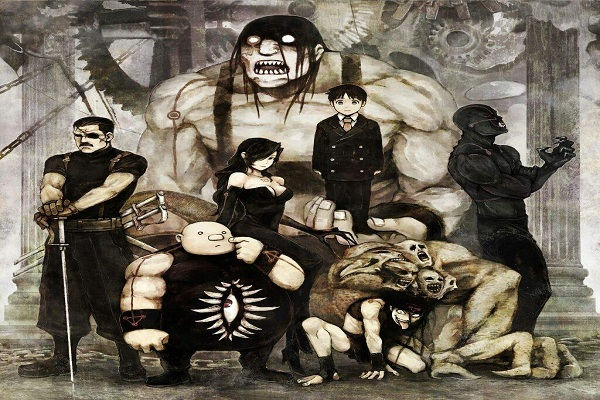Fullmetal Alchemist: Brotherhood – Sloth’s Life and His Ironic Death
- jacksonhenry297
- Dec 16, 2020
- 3 min read
Fullmetal Alchemist: Brotherhood is, without a doubt, one of the most popular anime on the planet. It is hard to imagine its impact on the manga/anime world in the last decade. Although many factors are attributed to its success, a fearsome cast of supervillains is probably the biggest one. It is impressive how the archvillain of the story was once just a little homunculus in a flask. Father dared to dream big despite his limitations and went on to almost rule the entire world. When he tricked Van Hohenheim to help get him to get a bigger body and new powers, it would have seemed that is all that he might have wanted, but unfortunately, it was the beginning of decades of bloodshed that was part of Father’s grand plan. Father went on to create his own children by ridding himself of the seven deadly sins.

The seven deadly sins were seven villains on the show who played a crucial part in Fullmetal Alchemist’s overall plot. One of these sins was Sloth, which manifested itself as a giant with a lumbering physique and dead eyes. Unlike his sister, Lust, a cunny spy assassin, Sloth was a blunt tool used by Father to accomplish Herculean tasks.
Sloth’s gigantic physique gave him immense physical power, but it also made him slow. He usually walked slowly and rarely talked; it was evident that he disliked being asked to do anything. However, he never failed to accomplish his tasks even though he usually preferred to find the easiest and the quickest route to do it. His sibling, Envy, liked to taunt enemies, but Sloth couldn’t care less. He would either walk right past anyone he encountered or crush them if he needed to; for him, it was always about getting his job done as soon as possible. His physique made him the ideal homunculus for heavy manual labor, which was an essential part of Father’s grand plan.
Just like his brothers and sisters, Sloth, too, can regenerate his body using Philosopher’s Stone. He also used to tie things together using the heavy chains and cuffs on his wrists. Surprisingly, Sloth can also move at high speed if he really needs to, but he fails to control his direction when he is moving fast. His high-speed attack can be used for defensive purposes when his opponent gets the upper hand in the fight. But Sloth avoids utilizing this power to prevent the sin of wasted potential.
Sloth worked alone, tirelessly for Father’s grand plan, and never failed to accomplish his tasks. Just like Gluttony, Sloth, too, was a useful tool that could be extremely helpful. He was given the task to dig up a tunnel beneath all of Amestris in secrecy; this tunnel later turned out to be the world’s largest transmutation circle that was very important for Father’s plans. Sloth is often ignored whenever there is a discussion about the show’s villains, but he undoubtedly played an essential part in ensuring that Father’s plans succeeded.
The villains in the series died ironic deaths, and Sloth was not an exception. On the Promised Day, he fought in the central government building to ensure that no one came in Father’s way when he was finally putting his grand plan into action. It would have been impossible to defeat him if Alex and Olivier Armstrong would not have teamed up to fight against the giant. Sloth’s adversaries forced him to use his super-speed as he failed to defeat them with his regeneration and endurance alone. He surprised the Armstrongs by using his high-speed attack and broke many bones in the process. He went on to smash walls, and it was evident that he hated that he had to resort to super-speed to get rid of his enemies.
At one point in the fight, Sloth had Armstrong cornered, but fortunately, Sig and Izumi Curtis arrived there at the right time. Izumi lifted him in the air, and Alex and Sig joined hands to impale him using the alchemy spike. It turned out to be a mortal wound, and even though Sloth tried to persist but soon we crumbled to dust. Even as he was dying, he only complained about the effort that dying and living took. Sloth lived his entire life working for Father’s grand plan and his wishes, even though he hated to work hard. It is ironic the sin that he was created using and the type of life he lived.



Comments